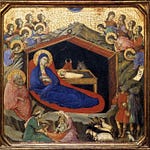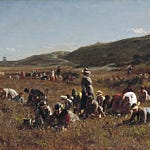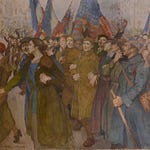It’s easy to trace the nearby origin of our Word of the Week, letter. It comes into English by way of those Norman French and their boatloads of words: Old French letre, from Latin littera. The word could mean either the single letters of the alphabet, or a letter such as an Arab doctor and traveler might send to his teacher, or literature generally, as in the still active phrase arts and letters. We call someone illiterate who cannot read, but even if you can read, you may be unlettered if you have not put that ability to good use.
But what was the Latin source? Here’s where we get into some real archaeological digging, and where it gets personal, too, at least for me. When I was a very little boy, my mother tried to get everybody to call me by my given name, Anthony. She liked that name. It was my father’s name, and my grandparents called him that, as did some of his older siblings (he was the 7th child of 10 surviving children; one of his sisters died of leukemia at age 7, on the same day he was born). But everybody called me Tony anyway, and on my mother’s side it meant there was Big Tony and Little Tony, as there already was Big Joe and Little Joe, Big Frank and Little Frank, and Big Bobby and Little Bobby. So my mother, giving in, decided that she’d name the rest of her children in such a way that there wouldn’t be any shortenings: Lisa, Mark, and Marianne. Anyway, the name Antonius (the th in English has no business being there, so that the British who pronounce Anthony as Antony have good cause) is well attested in ancient Rome, as everybody knows from its most notorious bearer: the ruthless Marcus Antonius whose love for Cleopatra got the better of his seamanship in the Battle of Actium. But it appears that that name Antonius is Etruscan, not original to Latin. It was the Etruscans who brought an adapted Greek alphabet to Rome, just as it was the Etruscans who taught the Romans the use of the arch, and the aqueduct, and the Greek pantheon of gods. Don’t worry, I’m getting to our word, letter!
The Etruscans lived in north and central Italy: and maybe the most famous and popular region in all of Italy took its ancient name from them. That’s Tuscany, where Florence and Siena and Pisa and so many glorious old cities are. They had a very high civilization, and in fact some of the kings of Rome before the establishment of the republic were Etruscan, Tarquin the Proud being the last of them. The last native speaker of Etruscan probably died in the first century A. D., all having been squeezed out by Latin and its sister languages along the peninsula. They left a lot of place-names and personal names and religious terms behind, and one of those words seems to have been the source of Latin littera, which is appropriate enough. And yet, just as the Etruscans got their letters from the Greeks, so they got the word for letter, too! It comes from Greek diphthera, a writing tablet, not stone but prepared leather.
“Wait a bit!” you say. “How the heck do you get from diphthera to littera?” Blame it on the Sabines. Those early rivals of Rome spoke a dialect of Latin, and they had a peculiar habit of pronunciation that’s relevant here. First, put the tip of your tongue on your gum ridge behind your upper teeth, as if you were going to make the sound D. Don’t move the tongue. Now, instead of making that sound, breathe easy and let your vocal cords vibrate. Do you hear it? You will be making a dental L, such as is made in German and Italian (it’s not like the “dark” L in English). The Sabines pronounced some words beginning with D followed by a vowel as if they began with that L. Some of the Sabine pronunciations stuck. There are others: Latin lingua, for example, begins with a Sabine L, replacing *dingua, which, as you can now more readily see, is a cousin of English tongue. So our word letter is a cousin of that word that names a disease which afflicts the sufferer with a hide-like covering upon the throat: diphtheria.
Ah, the invention of letters! The greatest software ever, permitting the very thoughts of one human being to enter the thoughts of another, across any extent of time or space! People once wrote letters all the time. They could sometimes put more of themselves in a letter than is possible in a telephone call: I don’t mean that the letters were longer, but that they were something other, sometimes even small works of art, a kind of present. For there are things you may say in a letter that you’d never say person to person, just because you can take your time, collect your thoughts, suggest more than you say outright, or say outright something you’d not have the courage to say with your voice, expressions of love and gratitude and honor — I am thinking here of letters worthy of being preserved. When I read the letters of Civil War infantrymen to their loved ones back home, I can hear other letters behind them, such as the rhythms and the phrases of Scripture, and I seem to enter another world, strange and yet familiar at once, and better than any science fiction.













